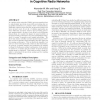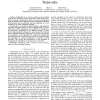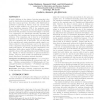316 search results - page 49 / 64 » Oblivious interference scheduling |
137
click to vote
INFOCOM
2009
IEEE
15 years 7 months ago
2009
IEEE
—Congestion control in wireless multi-hop networks is challenging and complicated because of two reasons. First, interference is ubiquitous and causes loss in the shared medium. ...
121
Voted
MOBICOM
2009
ACM
15 years 7 months ago
2009
ACM
In cognitive radio networks (CRNs), spectrum sensing is key to opportunistic spectrum access while preventing any unacceptable interference to primary users’ communications. Alt...
101
click to vote
ICC
2008
IEEE
15 years 7 months ago
2008
IEEE
— Scheduling in an ad hoc wireless network suffers from the non-convexity of the cost function, caused by the interference between communication links. In previous optimization t...
VTC
2007
IEEE
15 years 6 months ago
2007
IEEE
This paper evaluates the effect of the channel estimation inaccuracy on the performance of an HSDPA system. This study provides some results from system level simulations that have...
SIGMETRICS
2006
ACM
15 years 6 months ago
2006
ACM
A major challenge in the design of wireless networks is the need for distributed scheduling algorithms that will efficiently share the common spectrum. Recently, a few distributed...



